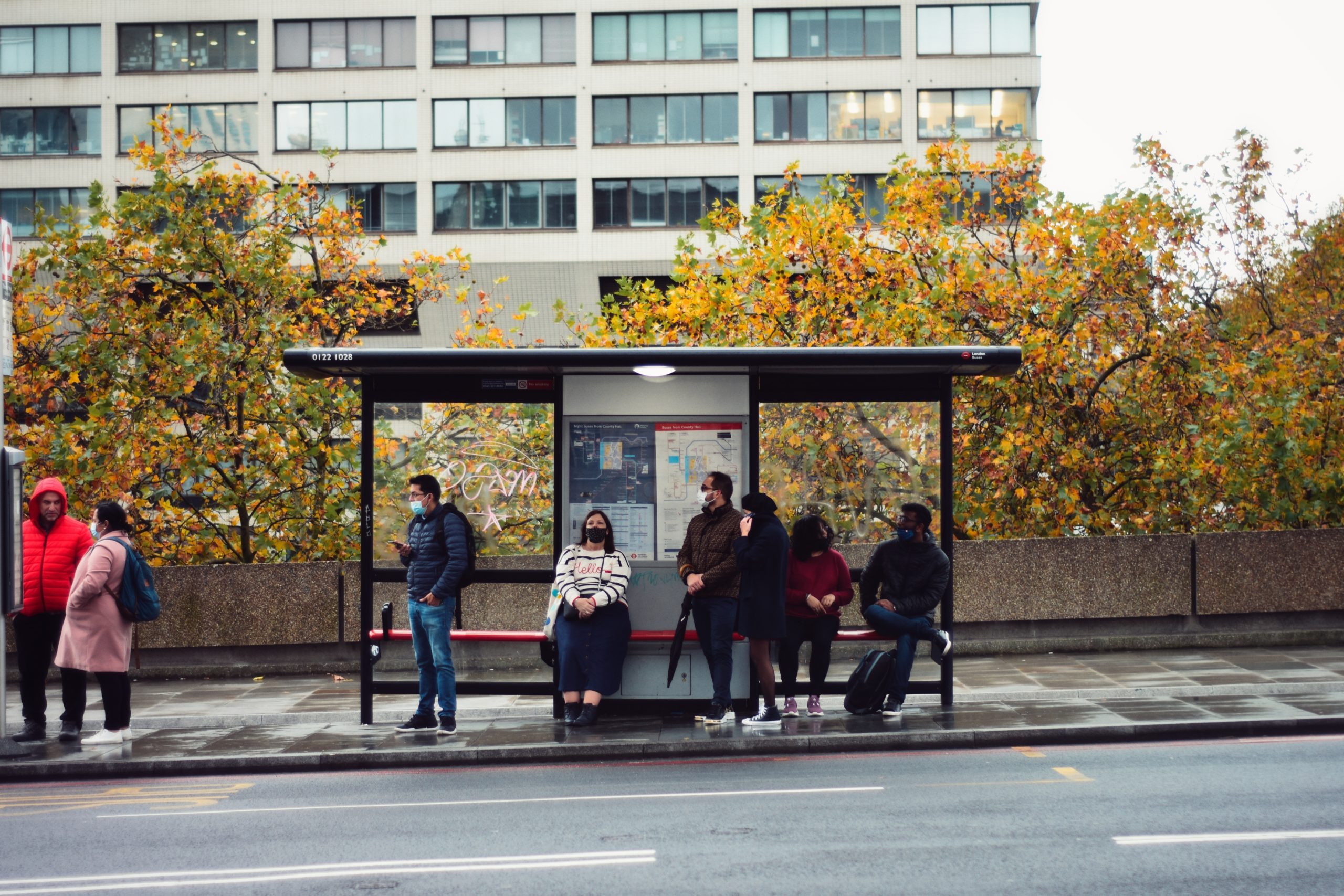September 2, 2022
Kritee Ahmed
After I drop off the kids this morning, I hop onto the bus. Aside from the driver, to whom I don’t pay much attention, is a Black man standing next to the driver. He may be a TTC route supervisor, and I only notice him because I have to navigate around him. Once I sit down, I notice the driver and the supervisor conversing. I’m not paying attention to what they’re saying, until the bus comes to a sudden halt at a traffic light. While there is a bus stop here, it’s not a stop for the bus I’m on. A masked Black woman approaches the bus. She comes on to the road, indicating she needs to get on. The driver signals to the supervisor that he can’t let her on. The supervisor says, “All you can do is say, I can’t let you on.” The driver looks towards the woman and says, “I’m sorry.” The woman is irate and seems to be pointing at her watch. She starts to gesture. The driver repeats and gestures back, “I’m sorry. I’m sorry.” As the bus moves on, the supervisor says, “You can’t let them on because if you make an exception and they slip while getting on, then you’re in shit. But then, if you don’t let them on and they start kicking the bus….” I miss the rest of the conversation until I catch the supervisor’s final words: “You see, ya cyan win.”

It is this phrase, that workers can’t win, that haunts me. That even under these conditions when workers are showing increased desire to be unionized, the Ontario government in other contexts is scaling back on their rhetoric and action in union negotiations with once-called ‘good essential workers.’ The climate for change is ripe, and yet, what will the future hold? How can workers “win”? How can and do workers navigate this terrain?
When I think of a post-COVID worker recovery, I am left to wonder how my own research can help inform the realities of the day. In studying public transit organizations in Toronto (Toronto Transit Commission - TTC) and London, U.K. (Transport for London - TfL), I explore their hyper-focus on customers and customer service and the work that workers do. I had initially thought that the emphasis on serving the customer in public services, more generally, was a rather recent trend invoking the neoliberalization of public assets through changing the nature of who was being served: from citizen to customer and in this case from passenger to customer (Ahmed, 2016). There is of course some truth in this, but my research had come to reveal there was more to the story.
I had come to realize that the “customer” was omnipresent in managerial and organizational discourse. Exploring these discourses provided signals about the terms within which workers work. They also provided analytical cues to study changes in work organization. As a signal, the word “customer” is associated with “neoliberalism.” Neoliberalism may be thought of as a movement that within organizations can refer to the attempts to mimic private business practices, particularly within public organizations (Isin, 1998; Keil, 2002; Peck, Theodore and Brenner, 2009, pp. 59-62). However, my research has shown that the history of the customer goes beyond what we might assume to be neoliberalism, and it opens up a way for us to rethink work and labour demands.
Internal staff magazines from one of Tfl’s predecessors, the Underground Group—a private firm which governed much of public transport in London—had discussed the figure of the customer as early as 1932 (Stations’ Proficiency Competition, 1932, p. 369). Meanwhile, in 1927 the internal staff magazine for the Toronto Transportation Commission, the predecessor of the modern TTC, referred to the organization’s user base as “customers” as well (Do You Sell Gasoline and Show Leather or Street Car Rides, 1927, p. 1). Throughout these organizations’ histories and through their documents, I had found the customer figure and hints of private sector business practices peppered throughout organizational documents. Appearing. Then disappearing. Only to reappear again. Interestingly, this meant that the idea that the customer only appearing recently in public organizations as an expression of neoliberalism couldn’t be the only explanation. And indeed, this hinted there was more to how this knowledge could be useful for working people.
This was later confirmed in interviews with research participants, the likes of which included transit workers, union officials, and organization managers and directors. For some, the hyper-focus on customers and customer service could indicate a loss of control at work or a lack of awareness about ridership. Some participants had indicated that they were always doing good customer service. Yet, in other interviews, there was indication that the figure of the customer wasn’t always a menacing figure signalling the ills of neoliberalism. Among these participants, there were hints that perhaps there was room to navigate within the discourse of the customer in public organizations by, for example, thinking through how to improve a customer’s experience of service in a way that was mindful of those who provided that service. After all, when a worker is working under good conditions, they can best be “customer-centred.” This led me to wonder that if organizations and management set the terms of work, is it possible to navigate within those terms in a way that is worker-friendly? And what would be the consequences?

When the TTC fully embraced the idea of good customer service, something interesting happened. This occurred at a time when workers were put under intense scrutiny, particularly through social media. Eventually, this led to the Customer Service Advisory Panel report, which acknowledged the extreme roles bus operators were forced to play at work. When customer feedback was solicited by the TTC, initially negative feedback skyrocketed. Soon after, compliments increased too.
My findings thus serve as an important reminder of the work of cultural critic Stuart Hall (1992). Famously, Hall (1992) had correctly argued that in media, the preferred media messages fashioned and transmitted by its producers aren’t always consumed and understood by its receivers as intended. Similarly, the lesson for us is that while managerial and organizational discourses may have their own preferred intention built in by their creators, how workers interpret it, and how they act on it—how anyone acts on it—can lead to outcomes no one can predict.
Historian Michel Foucault (2010) however provides an important warning for a different context, which is nonetheless relevant. When thinking about relying on the terms set by others for winning working conditions, heed his words: “My point is not that everything is bad, but that everything is dangerous, which is not exactly the same as bad” (p. 343). Advocates can champion customer-focused improved working conditions, but they may also be subsumed by them. Similarly, when New Labour came to power in the UK there was some excitement for a post-Thatcher UK. But the result was marketization and privatization of public services—reminders of the danger of taking a risky path.
Learning from workers in how they navigate managerial and organizational discourses is key. If the customer has been around for a long time, then it may just be part of the everyday, managerial discourse. Thinking about the customer in this way opens the door to re-envisioning and re-purposing it to advance worker rights and stronger working conditions. How can this be done? By centring the customer, can working conditions also be improved? In other fields, such as in education, will centring the student improve working conditions ? After all, good working conditions for workers creates the ripest of conditions to create the best possible service for whom those workers must serve.
So perhaps this leaves us with an important message to reflect on this Labour Day weekend. Perhaps not in the conditions of their choosing, but indeed little by little, workers might be able to win by rethinking and repurposing what is already there. Yes, we can win.
